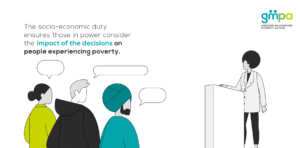Socio-economic duty 
At GMPA we believe that the socio-economic duty can act as a powerful tool for addressing poverty and creating a fairer society. Formal implementation of the duty by the Scottish and Welsh governments and voluntary adoption by local public bodies in England is evidencing the impact the duty can have.
Despite this, successive UK governments have chosen not to enact the socio-economic duty (the duty is contained in Section 1 of the Equality Act 2010). If enacted, the duty would legally require public authorities to consider the way their decisions increase or decrease inequalities that result from socio-economic disadvantage.
As GMPA we are campaigning for enaction by the UK Government and encouraging voluntary adoption by public bodies. Through our work we are supporting local public bodies to voluntary adopt the duty and maximise the impact it can have through effective implementation.
Could GMPA support your organisation with effective implementation of the socio-economic duty?
 Do you want guidance on how to adopt the socio-economic duty to ensure it has the greatest impact possible?
Do you want guidance on how to adopt the socio-economic duty to ensure it has the greatest impact possible?
We can offer you support to help you adopt the socio-economic duty and evaluate its impact.
Adopting the duty means organisations must ensure their decision making takes full account of socio-economic disadvantage. This work can complement anti-poverty, inclusive economy, and equalities approaches, and where appropriate, contribute to a ‘levelling up’ agenda.
Contact Tom Waring at thomas@gmpovertyaction.org for a free initial conversation about GMPA’s consultancy work on this issue.
Resources
At GMPA we have produced several outputs to guide local authorities, and other public bodies with adopting the socio-economic duty.
The socio-economic duty in action: case studies from England and Wales (July 2023)
This report, co-authored by Greater Manchester Poverty Action and Just Fair, highlights case studies from local authorities and public bodies in England who voluntarily adopted the duty, and the Welsh government who formally adopted the duty in 2021.
The report finds that across England and Wales, the duty is being used to tackle inequality in a range of ways, including in recruitment, responding to the cost-of-living crisis, supporting families with the cost of school meals and during the Covid-19 pandemic.
Highlighting the innovative and varied ways in which public bodies are applying the duty to reduce the inequalities that arise from socio-economic disadvantage, this latest report is a useful tool for organisations considering their role in tackling poverty and socio-economic disadvantage.
Watch the launch event webinar here.
The current scale of the socio-economic duty in England (June 2022)
This briefing sets out the scale of voluntary adoption of the socio-economic duty by local authorities in England based on FOI requested conducted by GMPA.
Socio-economic Duty Guide (June 2021)
This guide is intended for local and combined authority officers, local councillors and metro mayors in England interested in tackling socio-economic disadvantage. The guide is also of use to local authorities (and other public bodies) in other parts of England.
It was developed by GMPA in partnership with Just Fair, Equality Trust, Amnesty, Compassion in Politics, Equally Ours, Runnymede, Thrive Teeside and Shelter.
Looking for a previous publication? Visit our archive.
